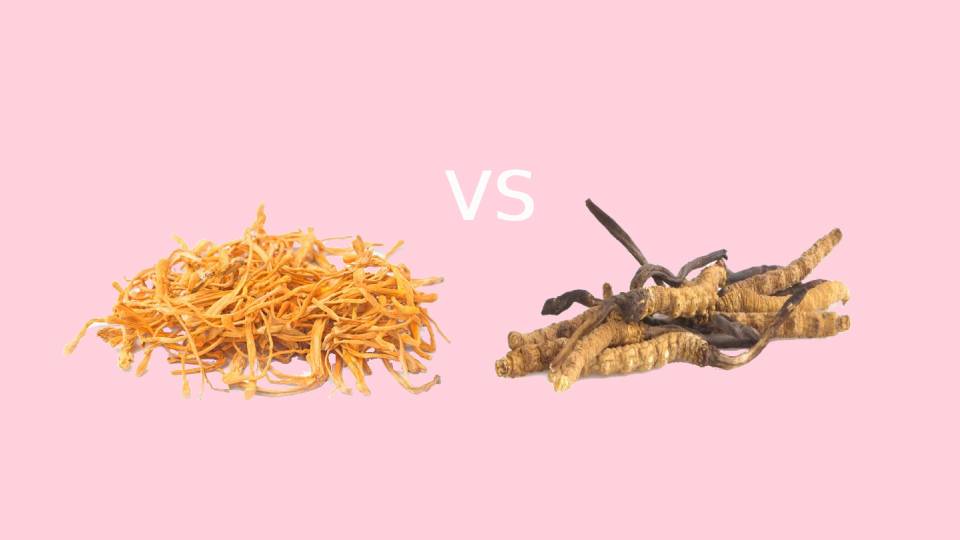Cordyceps Sinensis vs. Militaris: Differences, Benefits,
Cordyceps mushrooms have captured the attention of scientists and health enthusiasts alike due to their potential health benefits. In this article, we will explore the two most commonly known species of cordyceps mushrooms: Cordyceps sinensis and Cordyceps militaris. We will delve into their history, differences in physical characteristics, growing conditions, and chemical composition. Additionally, we will compare their benefits, and side effects, and examine the scientific research conducted on these remarkable fungi. Finally, we will guide you in choosing the right cordyceps supplement and offer tips on accessing the benefits of these mushrooms.
In this article:
What Are Cordyceps Mushrooms?
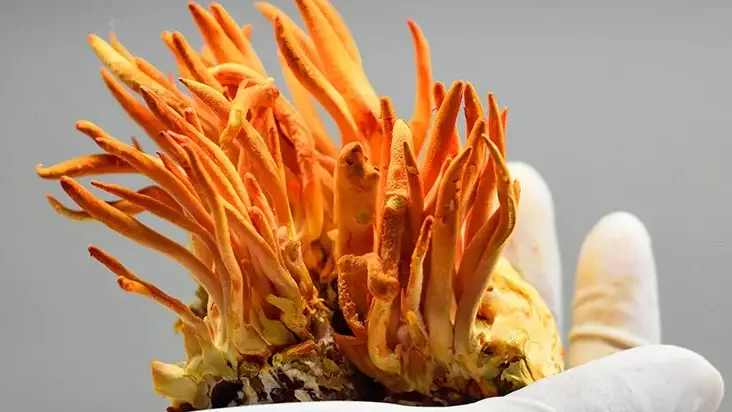
These unique mushrooms belong to the genus Cordyceps, comprising various species known for their medicinal properties. Cordyceps mushrooms are renowned for their adaptogenic qualities, meaning they can help the body adapt to stress and promote overall well-being.
They have been traditionally used to support energy, vitality, and immune function. Moreover, Cordyceps mushrooms have been subject to extensive scientific research, with studies exploring their effects on various aspects of health, such as immune system modulation, athletic performance enhancement, and antioxidant activity.
These mushrooms can be consumed in different forms, including extracts, capsules, and powders, making them accessible and convenient for daily supplementation. They can be added to tea, coffee, or smoothies, allowing for versatile usage. Moreover, cordyceps can be incorporated into recipes like soups, stews, and even desserts, providing a creative way to enjoy their benefits.
NOTE
As with any dietary supplement, it is advisable to consult with a healthcare professional before incorporating Cordyceps mushrooms into your routine, especially if you have any underlying health conditions or are taking medications.
The Power of Cordyceps: Unleash its Benefits
The History of Cordyceps
Cordyceps is a genus of fungi that has been used in traditional Chinese medicine for over 1,500 years. The name Cordyceps comes from the Latin words “cord” and “ceps,” meaning club and head, respectively. There are over 350 species of Cordyceps that have been found worldwide. Cordyceps sinensis is the most well-known species and has been used as an herbal drug in Chinese medicine for more than 300 years. Cordyceps has been found to have numerous pharmacological and therapeutic implications, including antitumor activity and immune system improvement[1].
In ancient times, they were exclusively reserved for the Chinese emperors and the elite due to their scarcity. Traditional healers prized cordyceps for their potential to promote vitality, longevity, and overall well-being.
Cordyceps Sinensis vs. Militaris: What Are the Differences?
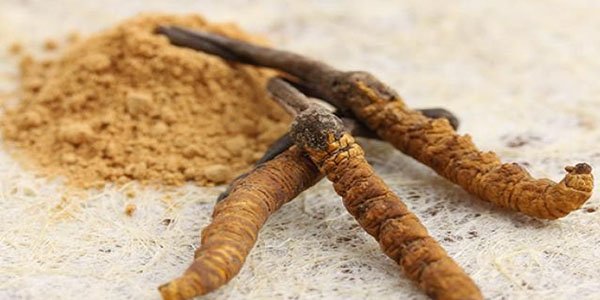
Cordyceps sinensis and Cordyceps militaris, although sharing many uses and benefits, do exhibit slight differences due to variations in their chemical composition. The key distinction lies in the concentrations of two compounds: adenosine and cordycepin[2]. Research has indicated that Cordyceps sinensis contains higher levels of adenosine compared to Cordyceps militaris, whereas Cordyceps militaris has higher levels of cordycepin than Cordyceps sinensis.
Let’s explore how these two species compare:
| Cordyceps Sinensis | Cordyceps Militaris | |
| Physical Characteristics | Slender, sinuous body with a brownish color, resembling a caterpillar | Vibrant reddish-orange hue, cylindrical shape |
| Growing Conditions | High-altitude regions of the Tibetan Plateau and the Himalayas | Thrives in a wider range of habitats, including laboratory cultivation |
| Chemical Composition | Contains bioactive compounds like cordycepin, adenosine, and polysaccharides | Rich in cordycepin, adenosine, polysaccharides, cordycepic acid, and ergosterol |
| Accessibility | Relatively scarce and less accessible for commercial production | More accessible for commercial production |
| Traditional Use | Treasured in traditional Chinese medicine for vitality and longevity | Highly regarded for its adaptogenic properties and performance enhancement |
| Research Studies | Studied for potential kidney support, reduced oxidative stress, and heart health | Explored for anti-inflammatory effects, potential anti-cancer properties, and impact on exercise performance |
Cordyceps Sinensis vs. Militaris: Comparing the Benefits
Here’s a table comparing the potential health benefits of Cordyceps Sinensis and Cordyceps Militaris:
| Health Benefit | Cordyceps Sinensis | Cordyceps Militaris |
|---|---|---|
| Immune Support | Yes | Yes |
| Adaptogenic Properties | Yes | Yes |
| Energy Enhancement | Yes | Yes |
| Antioxidant Properties | Yes | Yes |
| Anti-Inflammatory Effects | Yes | Yes |
| Respiratory Health | Traditionally used for this purpose | Some evidence of benefit |
| Kidney Health | Traditional use for kidney support | Some evidence of benefit |
| Athletic Performance | May enhance endurance | May improve stamina |
| Anticancer Properties | Some studies suggest potential | Emerging research on anticancer effects |
| Liver Health | Traditional use for liver support | Some evidence of benefit |
| Heart Health | Traditional use for cardiovascular support | Some evidence of benefit |
| Anti-Aging Effects | Traditional use for longevity | Some studies suggest potential |
IMPORTANT
It is important to note that while both Cordyceps Sinensis and Cordyceps Militaris show promising results in research, more studies are needed to further explore their effects and establish optimal dosages for specific health conditions.
Cordyceps Sinensis vs. Militaris: Comparing the Side Effects
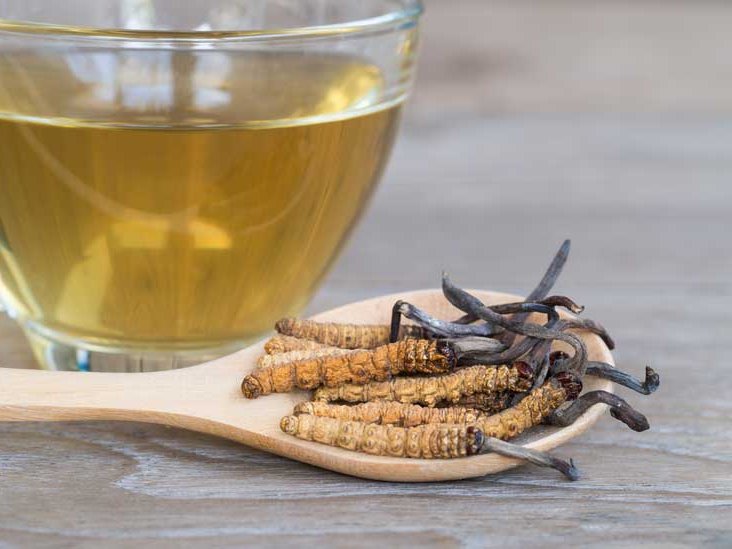
While they offer numerous advantages, it is essential to consider any potential side effects associated with their use. Let’s explore and compare the side effects of Cordyceps Sinensis vs. Cordyceps Militaris:
| Potential Side Effect | Cordyceps Sinensis | Cordyceps Militaris |
|---|---|---|
| Allergic Reactions | Possible, especially in sensitive individuals | Possible, especially in sensitive individuals |
| Gastrointestinal Issues | Rare, but can include nausea, diarrhea, or upset stomach | Rare, but can include nausea, diarrhea, or upset stomach |
| Sleep Disturbances | Rare | Rare |
| Blood Pressure | May affect blood pressure, either increasing or decreasing | May affect blood pressure, either increasing or decreasing |
| Autoimmune Conditions | Theoretically, may exacerbate autoimmune conditions | Theoretically, may exacerbate autoimmune conditions |
| Interaction with Medications | Potential interactions with blood thinners, immune-suppressing drugs | Potential interactions with blood thinners, immune-suppressing drugs |
NOTE
It is important to note that individual responses to Cordyceps supplements may vary. Some people may experience no side effects, while others may have mild reactions. As with any dietary supplement, it is always wise to start with a low dosage and observe how your body responds before increasing the intake.
Cordyceps Sinensis vs. Militaris: Research Studies
Numerous scientific studies have been conducted to explore the potential health benefits of Cordyceps sinensis and Cordyceps militaris. It is important to note that most of these studies have been conducted on animals, and more research on humans is needed to establish their effects definitively[3].
Research studies on Cordyceps sinensis have suggested its potential to improve kidney function, reduce oxidative stress, and support heart health. Cordyceps militaris studies have indicated its anti-inflammatory properties, potential anti-cancer effects, and positive impact on exercise performance[4].
Choosing the Best Cordyceps Supplement
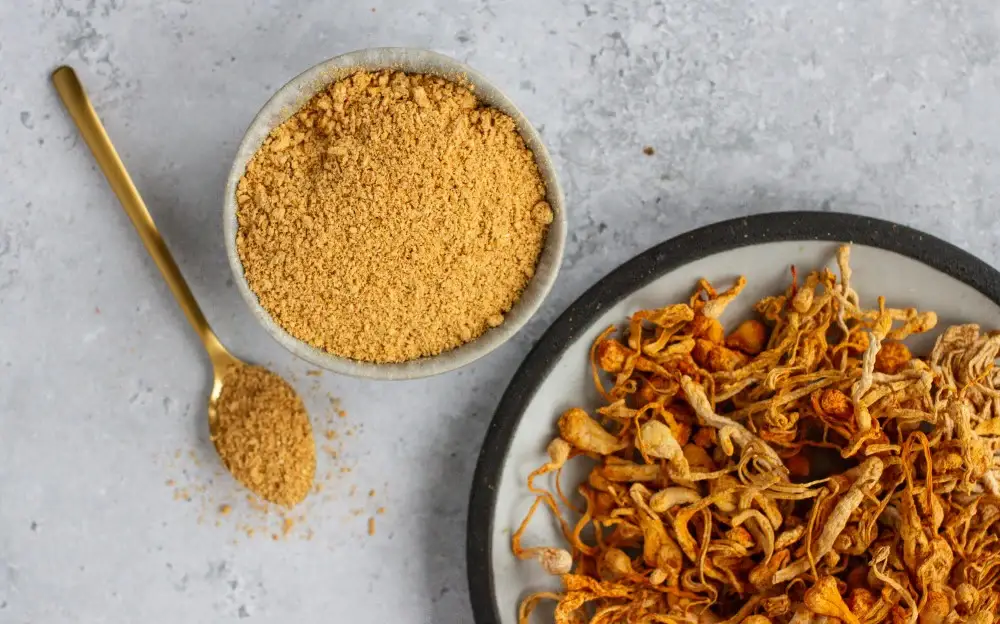
When it comes to choosing the best cordyceps supplement, it can be overwhelming given the multitude of options available. However, with a few helpful tips, you can navigate through the choices and find the one that suits you best.
Which one is right for you?
Here’s what you need to consider:
1. Determine the type of cordyceps
There are two main types to choose from—Cordyceps sinensis and Cordyceps militaris. While Cordyceps sinensis is rare and pricey, Cordyceps militaris is more affordable and sustainably cultivated. Both types offer similar benefits, so the choice depends on your preferences and budget.
2. Look for fruiting bodies
The fruiting bodies of mushrooms are the most potent parts. Ensure that the supplement you select contains 100% fruiting bodies rather than mycelium on grain, as the former is more effective.
3. Check potency
To ensure you’re getting the desired effects, verify that the supplement has been tested for potency. Some products may not deliver the stated amount of active ingredients, so opt for reliable brands with good quality control.
4. Consider the form
Cordyceps supplements come in various forms, such as capsules, tinctures, and powders. Choose a form that aligns with your convenience and preference. Capsules offer ease of use, while tinctures and powders can be easily incorporated into beverages or recipes.
5. Seek professional advice
If you have underlying health conditions or take medications, it’s essential to consult a healthcare professional before adding any supplements to your routine. They can provide personalized guidance based on your specific needs.
BOTTOM LINE
Remember, the best cordyceps supplement is the one that fits seamlessly into your daily routine and lifestyle. Consistency is key for reaping the benefits of cordyceps, including increased energy, enhanced immunity, and improved endurance. By making an informed decision and incorporating cordyceps supplements into your wellness regimen, you can potentially experience positive changes in your overall health.
FAQs
Which is Better Cordyceps Militaris vs. Sinensis?
Cordyceps militaris is often preferred for supplements and culinary use because it’s easier to cultivate and has similar health benefits to Cordyceps sinensis, which is rarer and harder to obtain. However, both offer potential health advantages, and the choice depends on availability and personal preference.
Is Cordyceps Militaris As Good As Sinensis?
Cordyceps militaris is considered equally valuable as Cordyceps sinensis. While they have some differences in physical characteristics and growing conditions, both species offer impressive health benefits. The choice between them depends on personal preferences and specific health goals. Both can be beneficial in their own ways.
Which Cordyceps is Best?
Cordyceps militaris is often considered the best choice for most people due to its ease of cultivation and similar health benefits to Cordyceps sinensis. It’s more readily available and affordable. However, the “best” Cordyceps can vary depending on individual needs and preferences, so it’s essential to research and consult with a healthcare professional.
Who Should Not Take Cordyceps Militaris?
Individuals who are pregnant, breastfeeding, or have a known allergy or sensitivity to mushrooms should avoid taking cordyceps militaris. Additionally, if you have any underlying medical conditions or are taking medications, it’s important to consult with a healthcare professional before incorporating cordyceps militaris or any other dietary supplement into your routine.
Final Thoughts – Choosing Between Cordyceps Sinensis and Cordyceps Militaris
In the debate of Cordyceps Sinensis vs. Cordyceps Militaris, the question of which is better is not straightforward. Both of these fungi offer a range of potential health benefits, and the choice between them depends on several factors, including your specific health goals, availability, and personal preferences.
Cordyceps Sinensis has a long history of use in traditional Chinese medicine and is often regarded as a precious and potent medicinal mushroom. However, it is rare, difficult to harvest, and consequently quite expensive. For some, its scarcity adds to its allure, but it may not be accessible to all individuals.
Cordyceps Militaris, on the other hand, has gained popularity due to its ease of cultivation and lower cost. Research on its health benefits has increased, and it’s now commonly available in supplements and various products. While it may not have the same mystique as Cordyceps Sinensis, its affordability and consistent availability make it an attractive option.
Ultimately, the choice between these two Cordyceps species comes down to personal preferences and circumstances. If you value tradition, rarity, and are willing to invest in a premium product, Cordyceps Sinensis may be appealing. However, if accessibility, affordability, and a growing body of research are more important to you, Cordyceps Militaris could be the better choice.
References
1. Effects of the Immunomodulatory Agent Cordyceps militaris on Airway Inflammation in a Mouse Asthma Model. Retrieved from https://www.sciencedirect.com/science/article/pii/S1875957209600048
2. World’s most valuable fungus: Cordyceps sinensis. Retrieved from https://www.researchgate.net/publication/354598701_World%27s_most_valuable_fungus_Cordyceps_sinensis
3. Effection of Anti-Fatigue of Selenium-Rich Cordyceps Militaris in Mice. Retrieved from https://www.researchgate.net/publication/298710625_Effection_of_Anti-Fatigue_of_Selenium-Rich_Cordyceps_Militaris_in_Mice
4. Cordyceps militaris improves tolerance to high intensity exercise after acute and chronic supplementation. Retrieved from https://www.ncbi.nlm.nih.gov/pmc/articles/PMC5236007/

